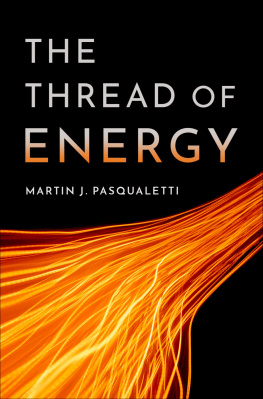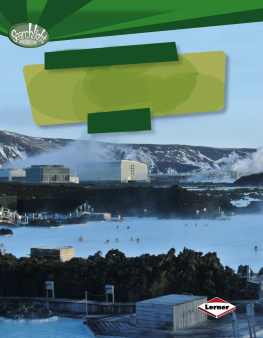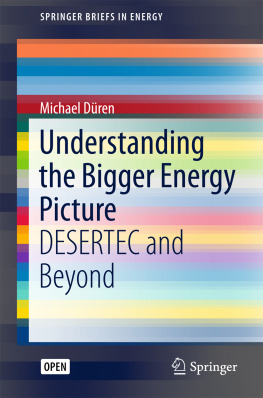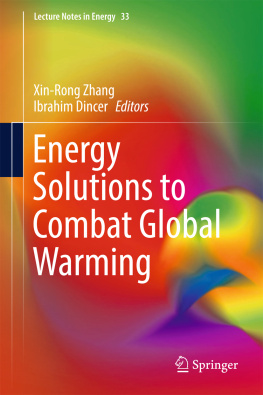THE THREAD OF ENERGY

Oxford University Press is a department of the University of Oxford. It furthers the Universitys objective of excellence in research, scholarship, and education by publishing worldwide. Oxford is a registered trade mark of Oxford University Press in the UK and certain other countries.
Published in the United States of America by Oxford University Press
198 Madison Avenue, New York, NY 10016, United States of America.
Oxford University Press 2021
All rights reserved. No part of this publication may be reproduced, stored in a retrieval system, or transmitted, in any form or by any means, without the prior permission in writing of Oxford University Press, or as expressly permitted by law, by license, or under terms agreed with the appropriate reproduction rights organization. Inquiries concerning reproduction outside the scope of the above should be sent to the Rights Department, Oxford University Press, at the address above.
You must not circulate this work in any other form and you must impose this same condition on any acquirer.
Library of Congress Control Number: 2021943214
ISBN 9780199394807
eISBN 9780197581292
DOI: 10.1093/oso/9780199394807.001.0001
Contents
A conceit of The Thread of Energy is that it is the first book to propose a central theme that ties together the varied roles that energy plays in the theater of human activities. While there are many good books on energy, most of them tackle the subject in quite similar and familiar ways. Either they review basic tenets of energy physics and engineering, expose in detail a single topic such as solar energy or oil, or examine energy resources individually with explanations and descriptions that are usually accurate but are not adequately keyed to todays growing social consciousness. I wanted something different. During its long gestation, I have been supported and aided by the encouragement, insights, inspiration, and examples of many people. These include Will Graf, a steadfast friend for over forty years in the competitive and unexpected tumult of academic life; Andy Blowers, whose elegant writings and tireless advocacy are an enduring inspiration to all those with interests in nuclear energy; Jerry Dobson, who joined me in the late 1970s in promoting energy geography, and who then went on to make more meaningful contributions to the breadth of the discipline of geography than just about anyone I can name; Gary Dirks, who brought peerless leadership skills with him when he returned to his alma matter from the corporate energy world in Asia at just the right time to deepen my appreciation of energy as a basic human right; Doug McQueen, whose quiet pestering to finish this book was always accompanied by underlying faith and support for the project; Benjamin Sovacool, who raised the bar just about out of reach for the rest of us with his many insights to the energy/society nexus; Marilyn Brown, whose contributions to our understanding of the relationships between energy and human activity have been exemplary at many levels of applied research and government policy; and Elizabeth Monoian and Robert Ferry, founders of the Land Art Generator Initiative (LAGI), who have managed to marry art, grace, and style with renewable energy in a way that has widened its appeal as an alternative to fossil and nuclear fuels. Thanks are also due to those who aided me with late stages of preparation. These include Jacob Bethem, Ankit Bagga, Barbara Trapido-Lurie, Nate Anbar, Debaleena Majumdar, Prashansa, John Hofmeister, Barry Solomon, and Arina Melkozernova, who created one of the original illustrations of the thread of energy that I have used repeatedly in my energy classes. Last, I wish to acknowledge the thousands of energy students who graced me with their presence, attention, experiences, questions, and curiosity. While I in no way hold any of these people responsible for any gaffes or missteps in what follows, I owe them all my heartfelt thanks.
Martin J. Pasqualetti, Sun Valley, Idaho, June 2021
When you open your eyes each morning, whether your first thought is a hot pot of coffee or a hot planet, whether you mount a bicycle or start a car, whether you eat bread or toast, or whether life is getting easier or is heading in the other direction, there will be one constant, always and forever. It affects your every experience and the experiences of all who share the planet. It weaves its way through all activities, from the most uncomplicated daily chore to the most complex international agreement, and through all ideas, from every memory of the past to every dream of the future. We are talking here about the thread of energy. As simple a concept as it may seem, its role in all human interactions is as fundamental as it is overlooked. I know this truth because I missed the centrality of its importance for many yearsuntil I made the suggestive connection that forms the basis of this book. Allow me to explain.
For as long as I can remember, I harbored a longing to travel, to see the world, to explore just for the surprises I would encounter and the things I would learn. The destination did not matter very much. It was the trip itself I coveted. From an early age, I consumed National Geographic, pored over maps for fun, and watched travel shows on television, but nothing satisfied. Nothing slaked my thirst for the real thing. I just wanted to get out of the house and scratch the wanderlust itch without a predetermined destination or personal restriction. My only goal was to visit places I had read about, explore places that were off the grid, dive into different cultures, perhaps learn a new language, and see some of the worlds remaining wild animals before they were all gathered into zoos or extinct.
Eventually, reluctantly, I came to accept that such trips were nothing more than fantasies. They would never happen. They would cost too much and take me away from the job that would be given to others if I left for an extended period. In short, my fantasies were utterly impractical and highly unlikely.
Then one day I received a letter from an attorney informing me that an elderly relative had just passed away, leaving me a hefty inheritance. It was the windfall that we all secretly hope for but never really expect to receive. It would permit me the means to fulfill my lifelong dream to wander the world, unfettered by the banalities of employment, commuting, housekeeping, or money.
In no time I had stored my belongings, sublet my apartment, resigned my job, and booked a seat on the first available flight. The destination was of no interest; I was off on the grand adventure of my dreams, with high expectations of what I would find, the lessons I would learn, and the questions that I could ponder and seek to answer.
Weeks quickly melted into months, and my experiences accumulated. I was learning more than I could have imagined about how to live an unassuming life. Traveling fast made me more flexible, more alert, more open to new ideas and alternative ways of thinking. One of the first things I noticed was that people were pretty similar everywhere, in that they desired pretty much the same things to sustain themselves: water, food, clothing, shelter, good health, security for their family, and the occasional dash of joy.
I also noticed an interlocking natural balance. This balance was especially apparent in the biospherethe part of the planet holding all living things. I realized that Nature was continually working to establish equilibrium. When a landslide blocked a river, the river eventually eroded its way through the debris, reestablishing the waters relentless journey to the sea. When a forest burned, the ashes helped fertilize the soil, and the forest eventually regrew. When volcanic ash darkened the sky, it caused catastrophic reductions in crop yields, but the skies eventually cleared and the crop yields returned. But I also noted something else, a common element woven throughout all aspects of human life, from the food we eat to the wars we wage. Furthermore, this common element was indifferent to a persons station in life, age, culture, history, or ethnicity. Soon I found myself asking how I could have overlooked the presence of this connective material for so long. My oversight was even more puzzling given that this entity held togetherwithout exceptionall human needs and all social activities. I had uncovered something more essential than water, air, or land. I had discovered the thread of energy.










